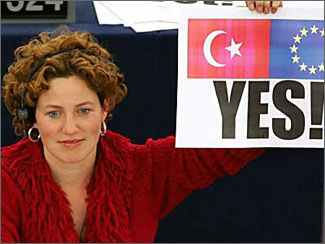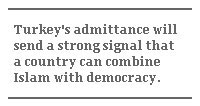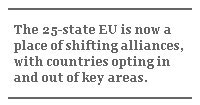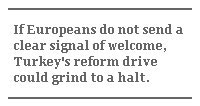A Reluctant Embrace
A Reluctant Embrace

BRUSSELS: The European Union is expected to make history this week by setting a date for opening membership talks with Turkey. After expansion from 15 to 25 states this year, Europe's embrace of Turkey will mark a key turning point in the evolution of the Union from a wealthy and exclusively Christian club into a vast and diverse multi-religious bloc stretching to the frontiers of Iraq and Syria. The EU's welcome remains an unenthusiastic, almost grudging affair, however; many top politicians remain uncertain over how to deal with a country they continue to view as too big, too poor, too undemocratic – as well as too Muslim and non-European – to ever become a full-fledged EU member.
Reflecting such ambivalence, EU leaders meeting in Brussels on December 16-17 may opt for a deliberate and conditional march lasting over a decade. In addition to urging ongoing efforts at political reform and economic modernization aimed at meeting EU entry standards, Ankara will be asked to comply with a string of strict new conditions. Prime Minister Recep Tayyip Erdogan will be asked to recognize (Greek) Cyprus, accept a permanent cap on labor migration to the EU, and agree that entry talks could be suspended at any time if there is slippage on political reform. Even more controversially, France and Austria are demanding that Turkey be ready to accept the fallback option of a privileged relationship rather than full membership if it fails to comply with EU political standards. There is also a growing EU consensus that negotiations with Turkey must not open until after key states like France hold their referendum on the bloc's new constitution, with talks perhaps spanning a period of 10 to 15 years.

European governments have been wrangling over the pros and cons of Turkish accession since 1959, when Ankara first applied for association with what was then known as the European Economic Community. The debate became fiercer after EU leaders recognized Turkey as a candidate country in 1999, reaching fever pitch in recent months as governments sought to reconcile the geo-strategic and economic advantages of opening the doors to Turkey with a growing, post-9/11 public wariness of Islam.
Advocates for membership argue that Turkey's economic vigor will inject more momentum into flagging EU economies, increase Europe's global clout, and improve Europe's relations with Islamic nations. Turkey's admittance will send a strong signal that a country can combine Islam with democracy, says Vurel Oger, a German member of the European Parliament who is of Turkish heritage. "Turkey could be a model state, an inspiration for the Islamic world," says Oger. Yet opponents argue that the entry of a Muslim nation of over 70 million people will weaken Europe's cultural identity and put an additional burden on EU finances, making the integration of ten mainly central and eastern EU countries, which joined in May, even more difficult.

The increasingly emotional debate goes beyond unease over Turkey's potential impact on Europe, however. It also reflects rising EU anxieties over the changing nature of the European project and uncertainty about the territorial limits of the bloc. Fears over the increasing radicalization of disaffected young Muslims in Europe following last month's murder of Dutch film maker Theo van Gogh by an alleged Islamic extremist have added urgency to the discussions.
Michael Glos, the parliamentary floor leader of Germany's opposition Bavarian Christian Social Union, warned recently that a green light for Turkey would send a signal for "enlargement mania." Other neighboring states, from Morocco and Tunisia to Ukraine, would use such a decision to knock at the EU's door, Glos cautioned.
Yet rapid transformations are already taking place in the Union. Once driven largely by the Franco-German dream of an ever-closer-union, the 25-state EU is now a place of shifting alliances, with countries opting in and out of key areas, including membership of the euro. Instead of further political integration, the EU's new priority is to implement a "neighborhood policy" designed to create a ring of stable and prosperous countries around Europe. And as for Turkey sucking in all EU funds, European governments are already reining in spending to take account of eastward enlargement.

Oger, meanwhile, debunks the argument that Turkish membership will destroy Europe's cultural identity and slow further political and economic integration. The bloc's 25 nations are already a mix of several cultures, he says: "Instead of culture, we should talk about values" such as democracy, the rule of law, tolerance, and gender equality, which Erdogan's government – in a bid to prove Turkey's European credentials - has been racing to espouse.
Transatlantic ties are part of the complex puzzle. German Chancellor Gerhard Schroeder, who is spearheading the EU drive to include Turkey, is driven by a strategic vision which demands that Europe must build stronger alliances with the Islamic world to compensate for an increasingly fragile relationship with Washington, says Udo Steinbeck, director of the German Institute for Middle East studies in Berlin. "Schroeder is positioning himself for a world of tomorrow and for that it is crucial to have Turkey in the EU," he argues.
In France, debate over Turkish membership in the EU is complicated by national political rivalries. Eager to score points against his political adversary Nicolas Sarkozy – who opposes Turkish entry – French President Jacques Chirac recently toned down his earlier enthusiasm for Ankara by saying the EU should consider the "fallback option" of a special relationship with Turkey if the country fails to meet political membership standards. A similar plea for privileged ties with Ankara rather than accession is the battle cry of Germany's conservative opposition leader, Angela Merkel.

Ankara also has to contend with the negative and old-fashioned image of Turkey perpetuated by the 3 million Turkish immigrants who currently live in Germany, Austria, and the Netherlands, says Oger. Europe's Turks are largely from rural Anatolia and have done little to change their ways despite almost four decades spent in Europe. They do not represent modern Turkey, says Oger, but their traditional conduct reinforces European prejudices. Germany's opposition is certainly capitalizing on this wariness by issuing strident warnings about the failure of multi-culturalism in the country. This, however, ignores the fact that many of Germany's Turks are fully integrated into society, says Steinbeck.
While Europe frets and fumes, Ankara's patience with the EU appears to be wearing thinner. "There will be great frustration in Turkey if the EU yes comes attached with special conditions," warns Esra Hatipoglu of the Marmara University in Istanbul. An offer of special relations instead of full membership will be seen as discrimination, she says, adding that if Europeans do not send a clear signal of welcome, Turkey's reform drive could grind to a halt.
Aware of the high stakes, EU leaders this week are expected to overcome their doubts and give the nod to Turkish membership. That, however, will not be the end of the story. The entry negotiations will be long and painful, with Ankara under persistent EU pressure to modernize its political and societal structures and Europeans still locked in difficult domestic battles over the content and contours of their future Union. But after 41 years of waiting in the wings, Turkey looks set to finally get a foot inside the EU door.
Shada Islam is a Brussels-based journalist specializing in EU policy and Europe’s relations with Asia, Africa, and the Middle East.